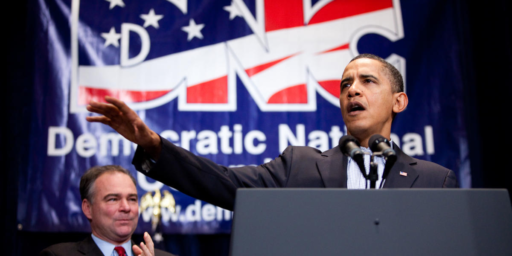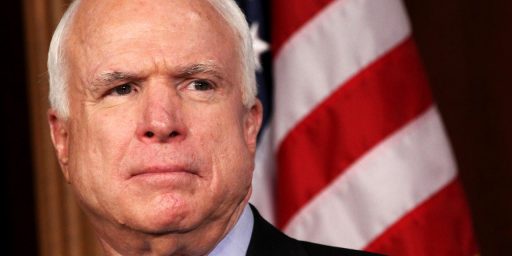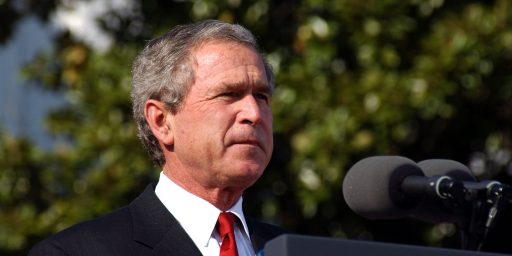Does ‘Experience’ Matter for Presidential Candidates?
Ryan Lizza has a rather confusing column in today’s NYT entitled “Nowadays, a Candidate Can Seem Too Experienced.” I say “confusing” because Lizza offers changing definitions of the word “experience” and many contradictory bits of information.
For example, he denigrates Rudy Giuliani’s background:
“Now they’ve elevated mayor of New York into an incredibly useful experience,” marvels Stephen Hess, a scholar at the Brookings Institution. “God almighty!”
Yet, earlier in the piece, he offers this:
Mr. Obama’s short résumé is sometimes compared to that of John Kennedy, who is remembered by some as a president who charmed his way into office when he was still a little green. But the comparison only underscores how the bar for experience has been lowered in the ensuing decades. Kennedy, after all, had five years in the Navy, six years in the House, and eight years in the Senate, not to mention a Purple Heart, the Navy Medal and a Pulitzer Prize.
For one thing, NYC has a population of 8.2 million, larger than most states. Further, his career included stints as clerk for a federal judge, U.S. Attorney, and Associate Attorney General. He has been named TIME’s Man of the Year (twice, if you include last year’s blanket award for all of us) and awarded an honorary knighthood by the Queen of England. Surely, that’s far more experience than Kennedy had?
Additionally, Lizza provides no evidence whatsoever that voters value experience less than they once did. Indeed, he seems to demonstrate the reverse:
In surveys, voters profess to value experience. For instance, the Pew Research Center reported last month that, contrary to conventional wisdom, one of the most important traits a candidate can possess is that he or she “has been an elected official in Washington for many years.” Only being Christian or having military service was more highly regarded.
Nor did these voters prefer gubernatorial experience to Washington experience. Pew asked if being a governor or being a member of Congress better prepares someone to be president; voters picked the Washington insiders over the state executives, 55 percent to 24 percent.
But the picture becomes vastly more complicated when voters are asked about specific politicians. For instance, of the six major Democratic candidates, those with the most experience have the least appeal to voters. Almost half of all Democrats say there is “no chance” they will vote for Mr. Richardson, Mr. Biden or Mr. Dodd, who have about 84 years of federal government service between them. For Mrs. Clinton, Mr. Obama, and Mr. Edwards, the percentages are far lower — 15 percent, 19 percent, and 24 percent, respectively. Experienced Washington Republicans face the same problem. The Republicans receiving the highest scores on the dreaded “no chance” question are all current or former members of Congress: Newt Gingrich (48 percent), Sam Brownback (51 percent) and Chuck Hagel (57 percent).
Dig deeper into the numbers, and experience seems to be even less important to voters, at least at this very early stage of the campaign. Pew asked poll respondents for snap impressions of the top six candidates (Mrs. Clinton, Mr. Obama, Mr. Edwards, Mr. Giuliani, Mr. McCain and Mr. Romney).
For five of those candidates, the overwhelming majority of impressions clustered around personal qualities rather than experience or ideology. The divide was particularly wide for Mr. Obama: 65 percent of the respondents talked about his personal traits (“good,” “intelligent,” “honest,” etc.) while only 14 percent were about his experience (mostly his lack of it). The spread was a whopping 75 percent to 8 percent for Mrs. Clinton and 39 percent to 17 percent for Mr. McCain. Voters consistently mentioned only one candidate’s experience — Mr. Giuliani’s. The snap impressions centered around his experience as mayor of New York or as a hero on 9/11.
So, voters tell us they prefer experienced candidates but that they also value other things, especially character. That the most experienced candidates in the race are either virtual unknowns (Brownback, Dodd, Hagel) or not particularly liked (Gingrich, McCain, and Biden) doesn’t really tell us anything about how voters value experience per se.
Further, Lizza tells us that experience really doesn’t matter, anyway.
Maybe that’s not a bad thing. Historically, experience has never been highly correlated with success in the White House. Since the nation’s founding, says Fred I. Greenstein, the presidential historian at Princeton University, there have been some highly experienced candidates who turned out to be subpar presidents (James Madison, Herbert Hoover), and others who turned out to be above-average presidents (Franklin Roosevelt, Ronald Reagan). Similarly, he says, there have been candidates with little government experience who were poor presidents (Jimmy Carter) and others who exceeded expectations (Woodrow Wilson, Dwight Eisenhower). “I don’t think you’d find any obvious relationship,” Mr. Greenstein says.
So what’s the point, then?






Anybody who characterizes Dwight Eisenhower as having little government experience has no idea of what generals do.
People say experience matters whenever they don’t like the inexperienced candidate for other reasons.
That is all.
It might also be interesting to reconsider the career of Woodrow Wilson. Consider his scholarly works, longtime service as an academic leader, and service as governor of New Jersey.
Anybody who characterizes Dwight Eisenhower as having little government experience has no idea of what generals do.
Yeah, I meant to comment on that and forgot. Indeed, as Supreme Allied Commander in Europe, his responsibilities were enormous. It’s laughable that 40 years of military service isn’t as good a preparation as 4 years as governor or a few years in Congress.
That George Washington fellow did quite well, too, with so little experience.
Or, conversely, Andy, people say that experience doesn’t matter when the candidate they like doesn’t have much in the way of experience.
I think it’s obvious that experience does matter. In any field. People with experience tend to be better problem-solvers.
Lack of experience is one of the reasons I didn’t vote for George Bush in 2000.
This discussion is even more interesting in light of the manifest preference of Democrats for micro-managers as presidential candidates (consider the last three Democrats elected to the presidency and you’ll see what I mean).
It probably boils down to the fact that there was a contract for a certain number of words for so many dollars by such and such a date.
I think experience is far less a requirement for the office of president than is leadership ability. Successful leaders seem to have the knack of attracting and deploying the right people in the right positions to get the job done.
Isn’t that begging the question, William d’Inger? How do you know if they have “the knack of attracting and deploying the right people, etc.” if they don’t have much experience?
For starters, how well they run their campaign is a good indicator of leadership. You can always check their high school, college, business and/or military accomplishments.
While I consider leadership more important than experience, it is not sufficient in and of itself. H. Ross Perot was a proven leader, but (in my opinion) he was a nut case.
Eh, you were just (quite sensibly) using lack of experience as a polite way of saying that you wouldn’t vote for an nincompoop.